牛津上海版九年级英语上册全册知识点归纳
九年级上册英语牛津知识点
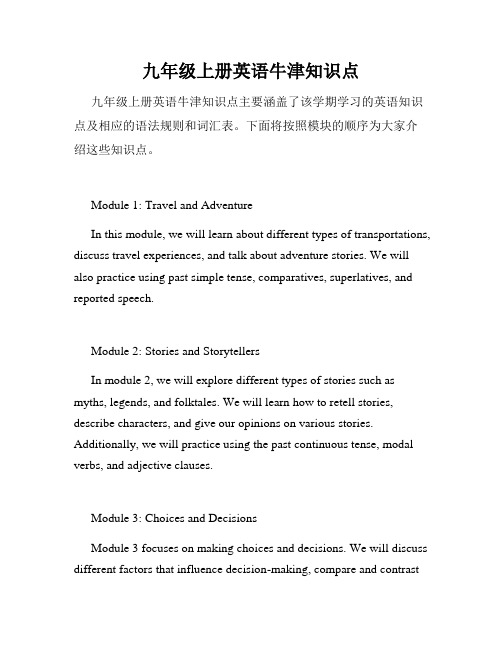
九年级上册英语牛津知识点九年级上册英语牛津知识点主要涵盖了该学期学习的英语知识点及相应的语法规则和词汇表。
下面将按照模块的顺序为大家介绍这些知识点。
Module 1: Travel and AdventureIn this module, we will learn about different types of transportations, discuss travel experiences, and talk about adventure stories. We will also practice using past simple tense, comparatives, superlatives, and reported speech.Module 2: Stories and StorytellersIn module 2, we will explore different types of stories such as myths, legends, and folktales. We will learn how to retell stories, describe characters, and give our opinions on various stories. Additionally, we will practice using the past continuous tense, modal verbs, and adjective clauses.Module 3: Choices and DecisionsModule 3 focuses on making choices and decisions. We will discuss different factors that influence decision-making, compare and contrastchoices, and express preferences. The grammar topics covered in this module include the present perfect tense, conditional sentences, and adverbial clauses of concession.Module 4: Great InventionsIn this module, we will explore great inventions and their impacts on society. We will learn how to describe inventions, discuss advantages and disadvantages, and express opinions. The grammar points covered include the passive voice, relative clauses, and noun clauses as the subject.Module 5: Growing UpModule 5 is all about growing up and experiencing changes. We will discuss various aspects of growing up, such as physical changes, emotional challenges, and responsibilities. The grammar topics covered in this module include the present perfect continuous tense, participial phrases, and adverbial clauses of time.Module 6: Challenges and SolutionsModule 6 focuses on challenges and finding solutions. We will learn about different types of challenges, discuss possible solutions, and give advice. The grammar points covered include the future tenses,conditional sentences type 1 and type 2, and adverbial clauses of purpose.Module 7: Science and NatureIn this module, we will explore the wonders of science and nature. We will learn about scientific discoveries, discuss environmental issues, and conduct experiments. The grammar topics covered include the past perfect tense, the causative form, and adverbial clauses of result.Module 8: RevisionModule 8 is a revision module where we will review all the knowledge and skills learned in the previous modules. We will practice through various exercises and activities to reinforce our understandingof the English language.以上就是九年级上册英语牛津知识点的简要介绍。
牛津九年级上册英语知识点

牛津九年级上册英语知识点Introduction:英语学习是中学阶段的必修课程,也是我们与全球交流的桥梁。
牛津九年级上册是英语学习的重要阶段,本文将详细介绍一些牛津九年级上册的重要英语知识点,帮助同学们更好地掌握英语技能。
一、动词时态和语态:动词时态和语态是英语学习中的基础知识点。
牛津九年级上册主要涵盖了一般现在时、一般过去时、一般将来时、现在进行时和现在完成时等时态的学习。
此外,还有被动语态的运用和构造也是这一阶段的重要内容。
同学们可以通过大量阅读和练习来巩固动词时态和语态的知识。
二、名词和冠词的用法:名词和冠词的用法是英语语法中的重要部分,也是牛津九年级上册的教学内容。
名词的单复数形式、名词所有格、可数和不可数名词的区分等知识点都要掌握。
同时,英语的三个冠词——定冠词(the)、不定冠词(a/an)和零冠词的正确使用也是同学们需要注意的地方。
三、形容词和副词的使用:形容词和副词在句子中起到非常重要的修饰作用,它们可以增强句子的表达效果。
在牛津九年级上册中,同学们需要学习形容词和副词的比较级和最高级形式,掌握它们在句子中的正确搭配和用法。
四、介词和连词的运用:介词和连词在句子中负责连接各个成分,使句子结构更加完整和流畅。
牛津九年级上册中,同学们需要学习常用的介词,如in、on、at等,并了解它们在句子中的具体用法。
此外,连词的用法也是同学们需要注意的内容,如and、but、or等。
五、动词短语和固定搭配:动词短语和固定搭配在英语表达中频繁出现,掌握这些固定搭配可以使句子更加地道和流利。
牛津九年级上册中,同学们需要学习一些常用的动词短语和固定搭配,如look forward to、get along with、take care of等。
六、间接引语和直接引语的转换:在交流中,我们常常需要引用别人的话,而间接引语和直接引语的转换就是用来达到这个目的。
牛津九年级上册中,同学们需要学习如何将直接引语转化为间接引语,并掌握转换规则中的必要变化,如时态、人称、指示词等。
沪教牛津版九年级上册unit3-4知识点复习

重难点梳理一、重点单词Unit 31.一顿饭2.把自己的想法(或经历、感情)告诉(某人)3.决定;抉择4.个人财产;私人物品5.要求;指望6.在国外;到国外7.商务;公事_______________ 8.个人的;私人的______________ 9.安排;确定;决定__________ 10.女儿________ 11.介意________ 12.流行的;时髦的13.流行款式;时兴式样14.过时的 15.(用熨斗)熨;熨平16.公开活动17.(根据所知)认为 18.(用于否定词组后)也19.关系;联系20.邀请21.需付费;价钱为22.类型;种类Unit 41.在线的2.模特儿3.规定饮食4.虽然;尽管5.很坏的;极讨厌的6.懊悔7.惭愧;羞愧8.情况;状况9.(儿童)牙膏 10.厌恶;羞愧11.优势12.窘迫的;尴尬的 13.建议;提议14.很生气;气愤15.杂乱;不整洁16.使恼怒的;使生气的17.不及格18.粗心造成的 19.评论20.要求;请求21.有礼貌的 22.没有一个;毫无23.考试二、重点短语Unit 31.做饭2.交流与分享3.出差4.制定规矩5.对……没有兴趣6.过时的7.帮着做__________________ 8.洗碗_____________________ 9.学校活动___________________ 10.有道理;有意义________________ 11. 发怒12.熨衣服13.浇水14.不同意15.对某人有耐心 16.对你有利Unit 41.寻求建议/帮助2.报警3.送……去医院4.节食5.嘲笑;讥笑6.对……感到惭愧7.与某人分享某物8.让某人受不了9.有……的习惯 10.搞得一塌糊涂11.与……吵了一架12.充满活力13.对……生气14.格格不入15.朝某人叫嚷16.与某人无关17.收到某人的信件(或电子邮件、电话等) 18下定决心19.注意;留心重点短语归纳keep away from… 远离be tired of… 厌倦…. make a decision 做决定at the age of…在……岁时be bored with…对……感到厌倦lose heart丧失信心get to到达take a message 捎口信at the moment此刻;现在be close to…靠近…at the same time同时play a joke on sb.开某人玩笑at the end of 在……末尾on business 出差have got有help with帮着做be abroad在国外out of date过时look after照顾for example例如make sense有道理such as例如give sb. a hand帮助某人make a list列出清单be patient with sb. 对某人有耐心in addition此外grow up长大communicate with sb.与某人交流ask for advice征求意见give sb. sth.= give sth. to sb.把某物给某人take sb. to...把某人带到……be worried about担心be on a diet节食make jokes取笑laugh at 取笑;嘲笑feel ashamed of对…..感到惭愧say bad things about sb. 说某人坏话drive sb. mad让某人受不了make a mess搞得一塌糊涂have a fight with sb.和某人争辩make noise 制造噪音lose weight减肥all day整天be annoyed with sb. 生某人气be afraid of 害怕next to靠近out of place格格不入shout at向……大声叫喊not… at all根本不;一点也不none one‟s of business与某人无关hear from sb. 收到某人的来信borrow sth. from sb.向某人借某物make up one‟s mind下定决心think of想起be successful成功in a few months‟ time几个月后to one‟s surprise另某人惊讶的change one‟s mind改变某人的想法句型分析考点一:Who makes most of the decisions in your family?你家里的大部分决定是谁做出的?(教第34页)※decision此处用作可数名词,意为“决定;抉择‟make decisions /a decision意为”做出决定,相当于decide。
沪教牛津版九年级上册9A知识点梳理--期末总复习(广州地区适用)
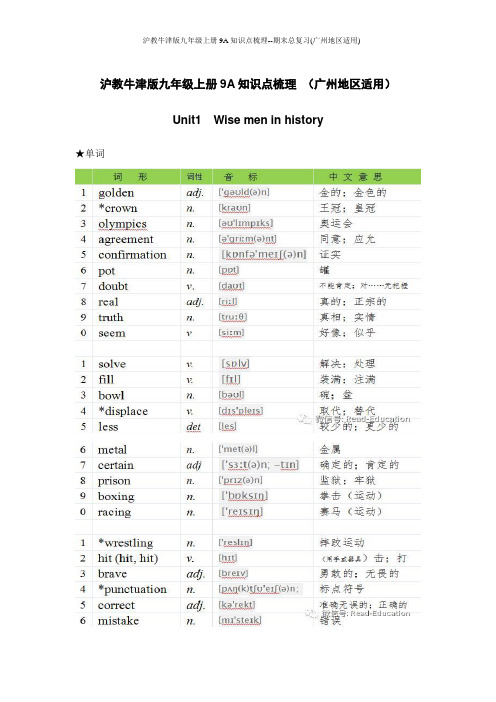
沪教牛津版九年级上册9A知识点梳理(广州地区适用)Unit1 Wise men in history★单词Unit1 知识考点★常考短语in ancient Greece 在古希腊ask sb for sth 向某人要某物fill…with…用……把……装满send sb to prison 把某人关进监狱think about = consider 考虑;思考tell the truth 说实话be filled with=be full of 充满;装满make sure 确保;设法保证run over 溢出something else 别的东西be made by + sb. 被某人制成both…and………和……都……be made of +看得见的原材料,由……制成be made from +看不见的原材料,由……制成(be) happy with 对...感到满意的= be pleased/satisfied withone…the other…一个……另一个……★课文解析1. At first, he was very happy with it.2.课文录音(1) at first "起初"辨析:at first与first of allAt first I didn't want to go,but I soon changed my mind.起初我不想去,可是不久我改变了主意。
First of all,open the windows,then turn off the gas,and if necessary,call an ambulance. 首先,打开窗子,然后关掉煤气,如果需要,叫一辆救护车。
(2) be happy with sb./sth 意为“对某人或事物满意的”,=be pleased/satisfied with sb./sthHis teacher is happy with him. 他的老师对他很满意。
沪教牛津版九年级上知识点归纳
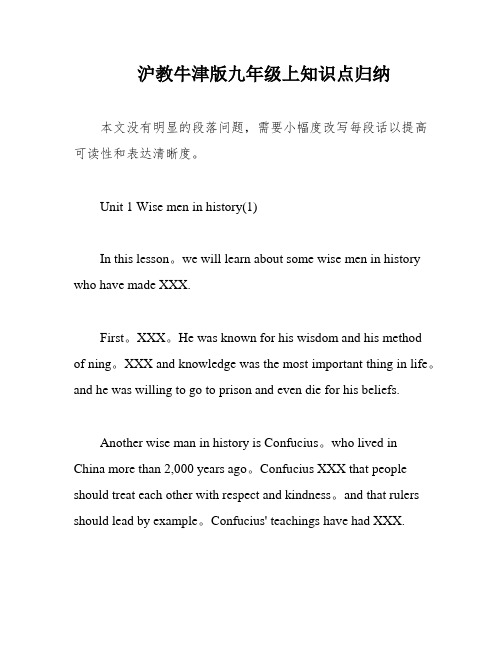
沪教牛津版九年级上知识点归纳本文没有明显的段落问题,需要小幅度改写每段话以提高可读性和表达清晰度。
Unit 1 Wise men in history(1)In this lesson。
we will learn about some wise men in history who have made XXX.First。
XXX。
He was known for his wisdom and his methodof ning。
XXX and knowledge was the most important thing in life。
and he was willing to go to prison and even die for his beliefs.Another wise man in history is Confucius。
who lived in China more than 2,000 years ago。
Confucius XXX that people should treat each other with respect and kindness。
and that rulers should lead by example。
Confucius' teachings have had XXX.Moving forward in time。
we come to Albert Einstein。
whois widely regarded as one of the most brilliant scientists of the 20th century。
XXX disarmament。
using his XXX justice.Finally。
we have Nelson Mandela。
who XXX 27 XXX his activism。
but he never gave up his XXX his release。
Unit3Unit5知识点整理牛津上海版九年级英语上册

2023学年牛津上海试用本九年级英语第一学期U3U5知识点整理Unit 31.opinion n.想法,观点=viewin one’s opinion=in one’s view 依某人的看法2.cute=lovely adj.可爱的(比,最) cutercutest3.responsibility n.责任=duty responsible adj. be responsible for主管=be in charge of4.death n.死die v. dead adj. dying 垂死的5.care for =take care of, look after照顾6.respect others 尊重别人7.faithfully adj. 忠诚地faith n. faithful adj.8.mess n.杂乱,粪便 e.g. What a mess! 多乱啊!’s more, =In addition, Besides 另外,而且12.extremely adv=very extreme adj. 非常extremely happy 极其开心13.happy adj.开心happily adv. happiness n. 反:unhappy14.right now=at once, right away, immediately 立刻15.be surprised at sb/sth 对…感到惊讶surprising news 令人惊讶的消息16.be shocked at sb/sth 对…感到震惊17.certain adj.certainly adv.=sure, of course 当然,一定18.apologize to sb for sth 为某事向某人道歉19.make a plaint 投诉plaint n. plain v. plain about 关于…投诉(抱怨)20. What’s wrong with you?=What’s the matter with you?你怎么啦?21.review n./v. 评论,复习=go over revision n.22.not only…but also…不但…而且…(可与both…and…, …, too. …as well, …as well as…等转换)但若连接主语时,not only…but also…要与第二主语保持一致, both…and…要用动词复数,as well as要与第一主语保持一致.neither…nor… 既不…也不… either…or…或者…或者… 连接主语,动词与第二主语保持一致23..It is a good idea to keep pet dogs.饲养宠物狗是一个好主意。
牛津沪教版英语九年级上重点知识复习

反义词: ___________
18.taste: _________ _________(词性)
19.teach: _________ _________(过去式, 过去 分词) 教我们你们英语: _________ 20. adj.十几岁的(指 13-19),_________
7. n.雨伞,阳伞பைடு நூலகம்________
23 n.网球_________
8. understand: _________ _________(过去式, 过 24. n.学期________.
去分词)
25.n.剧院,剧场,戏院________._
9. n.制服___________
10. n.单元, 部件, 装置___________ 11. adj.联合的,统一的___________ 12. adj. 联合的, 统一的___________ 13. adj. 联合的,统一的___________
--The radio says that it'll get _______later in the day. ...A. .,ba.....B.what.wors..... C.how.ba.... D.ho..,worse ( )4.--We will build a subway in Qionglai before2020.
★成功中考:
( )1.He was unsuccessful,______? .. A.i.h......B.wa.h..... C.wasn'.h.....D.isn'.he 考点 4.陈述句部分含有 have/has/had
1.当 hav.表示: “有”, 为实义动词, 助动词为 do/does/did 2.当 hav.作助动词:助动词为其本身 2. 当 have 作助动词: 助动词为其本身 2. 当 have 作助动词:助动词为其本身
上海牛津英语九年级上册

Units 1&2一、重点、要点归纳动名词1,动词ing作主语。
In many Asian cultures, avoiding eye contact shows respect.2,动词ing作介词宾语。
Without hesitating, she went to Simon and gave him a big smile.3,有一些固定搭配的词组后往往接动词ing。
如:be used to, give up, look forward to 等。
二、重点句式1,It is adj. of/for sb. to do sth.(1) 如果形容词用来描述不定式行为者的性格、品质的,用of。
这类形容词有:kind, good, nice, right, wrong, clever, careless, polite等。
(2) 如果形容词仅仅用来描述事物,用for。
这类形容词有:difficult, easy, hard, important, dangerous, impossible等。
2,People always prefer Debbie to me.prefer A to Bprefer doing A to doing Bprefer to do A rather than do B三、话题认知和了解肢体语言在人际交往中的意义和作用。
过关检测一、词汇1. Simon s________ and took some paper over to the fax machine.2. She came to r________ me that tomorrow is her birthday.3. There are a lot of d________ in our English study.4. Hard work is the k________ to success.5. Bill was such a l________ boy that he soon became one of the worst students in his class.6. Your best hairstyle d________ on the shape of your face.7. Fish and meat are healthy foods. Coke is an u________ drink.8. Please treat your hair well and be sure not to choose the h________ hair products.9. Do you m________ if I smoke here?10. Thanks to your help, I passed the English e________.二、短语hold up care for as a matter of fact as well as what’s up1. The pupils learn from each other _____________________ from the teachers.2. _____________________, Simon? You don’t look very happy?3. Debbie _____________________ her head _____________________, looks at people’s eyes, and simile before speaking to people.4. _____________________, a Westerner might consider a lack of eye contact to mean a lack of interest.5. Lily spent years _____________________her sick uncle.三、重点句式A 请根据要求作相应的句型转换。
沪教牛津版九年级上知识点归纳

1.语法知识:
(1)时态:一般现在时、一般过去时、一般将来时、现在进行时、过去进行时、过去将来时、过去完成时等。
(2)语态:主动语态和被动语态。
(3)条件句:零条件句、一般条件句、特殊条件句。
(4)定语从句:介绍定义或限制性信息的从句。
(5)名词性从句:作主语、宾语、表语或同位语的从句。
2.词汇知识:
(1)词汇学习:通过阅读、听力和写作等方式巩固词汇。
(2)词汇拓展:学习同义词、反义词、派生词以及词根和词缀。
(3)词组搭配:掌握常用的固定搭配和短语。
3.听力技巧:
(1)听力理解:通过听音频材料来理解句子、对话和短文的信息。
(2)关键词识别:通过识别关键词来获得对话或短文的大意。
(3)笔记记录:通过记录关键词或关键句来提高听力效果。
4.口语表达:
(1)对话表达:学习用简单句和复合句进行日常对话。
(2)问答练习:通过问答练习来提高口语表达能力。
(3)口头演讲:通过准备和演讲来提高口语表达能力。
5.阅读技巧:
(2)细节理解:通过阅读文章获取具体细节。
(3)推理判断:通过推理和理解上下文来解读文章。
6.写作技巧:
(1)写作结构:学习如何组织段落和整体结构。
(2)写作表达:提高写作表达能力,包括正确使用词汇和句子结构。
(3)写作素材:学习如何寻找和组织写作素材。
以上是对沪教牛津版九年级上知识点的归纳总结,包括语法、词汇、听力、口语、阅读和写作等多个方面。
通过系统学习和练习这些知识点,可以帮助学生提高英语水平。
初中英语 牛津上海版九年级上Unit2知识点及语法点
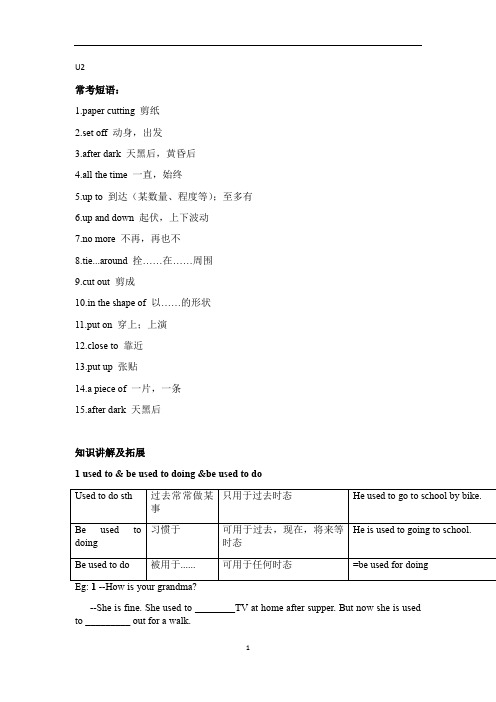
U2常考短语:1.paper cutting 剪纸2.set off 动身,出发3.after dark 天黑后,黄昏后4.all the time 一直,始终5.up to 到达(某数量、程度等);至多有6.up and down 起伏,上下波动7.no more 不再,再也不8.tie...around 拴……在……周围9.cut out 剪成10.in the shape of 以……的形状11.put on 穿上;上演12.close to 靠近13.put up 张贴14.a piece of 一片,一条15.after dark 天黑后知识讲解及拓展1 used to & be used to doing &be used to do--She is fine. She used to ________TV at home after supper. But now she is used to _________ out for a walk.A watch, goB watching,goC watching,goingD watch,going2 Bamboo can _______paper.A used to makeB be used makeC be used to makeD be used to making2 although 虽然,尽管与though同义,用来引导让步状语从句。
不能与but同时出现在句子中。
Although比较正式,常用于句首;though多用于非正式文体,表示强调。
Eg: --The boy can speak both English and Japanese_____he is only ten. --Wow, what a clever boy.A ifB becauseC although3 fit adj. 健壮的,健康的v. 合适,侧重于尺寸,大小合适。
牛津沪教版英语九年级上重点知识复习

牛津沪教版英语九年级上重点知识复习牛津沪教版英语九年级上重点知识复一、重点知识回顾1.很多同学都在中考中拼写错误的单词,你现在都掌握了吗?1.n。
waiter。
server2.wake: woke。
XXX3.wear: wore。
worn4.n。
XXX5.n。
e (noun)6.word: 单词7.n。
injury。
wound | adj。
injured8.write: wrote。
written9.wonder: 想知道2.发音技巧回顾巧记 oo 的发音1) 发短音 [u] 的字母组合有:oo,u,ou,o举例:book,put,could,wolf2) 发长音 [u:] 的字母组合有:oo,u-e,ue,ew,oe,o举例:moon,rule,blue,new,XXX,go 3) 特殊的:1) Room [u:] [u:] 1/15bedroom,classroom2) foot [u] [u:] root,Food [u:] good [u:]重点短语语法知识回顾1.相近短语辨析:4.相近的动词辨析Rise:上升Raise: 提高中文意思有:At times: 有时At a time: 一次XXX: 曾经At any time: 任何时候2.介词 since 的中文意思有:自从5.相近动词短语搭配:Put off: 推迟Put up: 提高;举起Put down: 放下;写下Put on: 穿上二、复要点1.adj。
usn。
variety各种各样的(短语):all kinds of2.n。
XXX3.n。
victory4.n。
village5.小提琴 (lin)6.visit (v.) - to go and see a place or person参观某地:1.我们明天要去参观博物馆。
(We are going to visit the XXX.)2.你曾经参观过长城吗?(Have you ever visited the Great Wall?)14.不寻常的 (unusual)15.难过的 (sad)16.在楼上 (upstairs)。
牛津上海版九年级上册Unit2知识点

九年级上册牛津版本Unit21f sh n.鱼肉(不可数)two fish2条鱼(同种类)two fish_es2种鱼(不同种)2.go fishing fish er man(men)渔夫3.sit-sat-sat v.坐seat n.座位4.elderly a.年长的an elderly man=an old man 老人5.elder/younger brother 哥哥弟弟8 years older than 比起。
大8岁6.control v.控制controlled7.be under control 在控制下be out of control 脱离控制8.pole n.杆子,极点the South Pole 南极9.dive-dived-dived v.潜水,跳水10.bang-banged-banged v.大声敲击1.require=need v. 需])要求requirement 要求n.2.hang-hung-hung v.悬挂=put up3.hang-hanged-hanged v.绞死4.move-remove (移走)return 回来retell 复述,replace 替代,repeat 重复5.tradition n.传统traditional a.传统的6.modern 现代化的 a. more modern-the most modern7.skill(s) n.技能skillful a.灵巧的,熟练地8.foot-feet 足tooth-teeth 牙goose 鹅-geese9.attract v.吸弓I attractive 吸引人的 a. attraction(s) n.吸引力10.begin-began-begun 开文台v. begi nn ing 开端n.1.joy n.高兴share our joy分享我们的欢乐to our/his joy 使我们高兴地是2.enjoy doing v.喜欢做enjoy themselves 玩得痛快3.enjoyable a.令人愉悦的an enjoy able life令人愉快的生活4.recent a. 最近的in recent years 近几年来recent news 最近的消息recently ad.最近用现在完成时(have/has+pp.)5.type=kind 种类n. type letters 打信件,打字v.6.high (高的)-height (高度)long (长的)-length (长度)7.wide (宽的)-width (宽度)deep (深的)-depth (深度)8.paint 画,涂颜料v. painter 画家n. painting(s)画n.9.bamboo(s)竹子neck 脖子skin n.皮肤10.pole 杆子n. the South Pole 南极1.up to=at most 最多2.5tart=set out/off 出发,动身2.6tart/begin doing=start/begin to do 开始做4.reach=get to=arrive at/in 至U 达5.so that =in order that + 句子为了6.in order to=so as to=to do 为了7.swallow n.燕子v.吞咽8.at night/at noon/at weekends 在周末中午周末9.the rest money 剩下的钱the rest people 剩下的人10.mention v.提至U situation n.场景,,情况,形势1.a straight line 直线 a. stand straight 笔直地站着adv.1.1magine doing v.想象做某事3.do good to=be good for 对。
初中英语 牛津上海版九年级上Unit1知识点及语法点
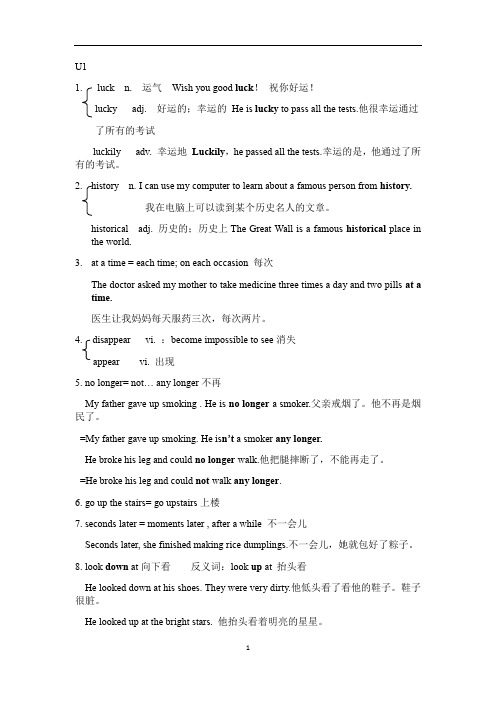
U11. luck n. 运气Wish you good luck!祝你好运!lucky adj. 好运的;幸运的He is lucky to pass all the tests.他很幸运通过了所有的考试luckily adv. 幸运地Luckily,he passed all the tests.幸运的是,他通过了所有的考试。
2.history n. I can use my computer to learn about a famous person from history.我在电脑上可以读到某个历史名人的文章。
historical adj. 历史的;历史上The Great Wall is a famous historical place in the world.3.at a time = each time; on each occasion 每次The doctor asked my mother to take medicine three times a day and two pills at a time.医生让我妈妈每天服药三次,每次两片。
4. disappear vi. :become impossible to see消失appear vi. 出现5. no longer= not… any longer不再My father gave up smoking . He is no longer a smoker.父亲戒烟了。
他不再是烟民了。
=My father gave up smoking. He is n’t a smoker any longer.He broke his leg and could no longer walk.他把腿摔断了,不能再走了。
=He broke his leg and could not walk any longer.6. go up the stairs= go upstairs上楼7. seconds later = moments later , after a while 不一会儿Seconds later, she finished making rice dumplings.不一会儿,她就包好了粽子。
牛津上海版英语九年级上册全书语法知识汇总
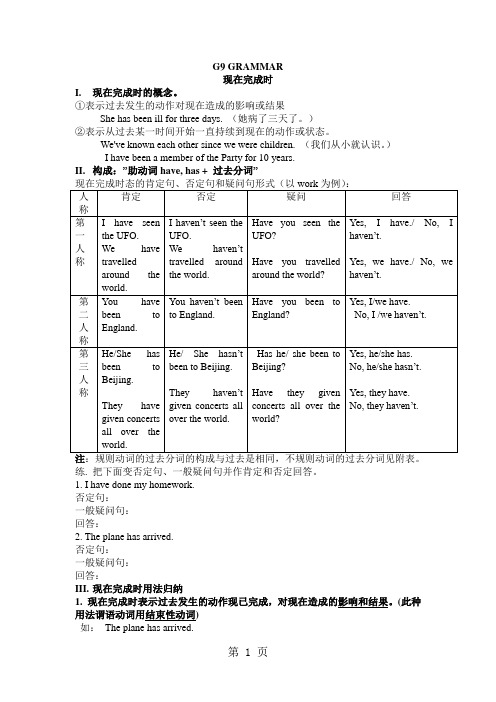
G9 GRAMMAR现在完成时I.现在完成时的概念。
①表示过去发生的动作对现在造成的影响或结果She has been ill for three days. (她病了三天了。
)②表示从过去某一时间开始一直持续到现在的动作或状态。
We've known each other since we were children. (我们从小就认识。
)I have been a member of the Party for 10 years.II.构成:”助动词have, has + 过去分词”练. 把下面变否定句、一般疑问句并作肯定和否定回答。
1. I have done my homework.否定句:_______________________________________一般疑问句:___________________________________回答:_________________________________________2. The plane has arrived.否定句:_______________________________________一般疑问句:___________________________________回答:_________________________________________III.现在完成时用法归纳1. 现在完成时表示过去发生的动作现已完成,对现在造成的影响和结果。
(此种用法谓语动词用结束性动词)如:The plane has arrived.常用的时间状语和副词:already (已经) 用于肯定句中,位置比较灵活,但通常放在have/ has 与过去分词之间如:I have already done my homework.yet (还,仍然,已经) 用于否定句和疑问句的句末。
如:Has she finished cooking yet? 他做完饭了吗?练:I have already done my homework. (变为否定句)_________________________________ever (曾经),句中,多用于疑问句如:Have you ever been to Shanghai?never (从不) ,本身否定;before (以前),句尾,独立用;just (刚刚),用于肯定句中,常用在助动词和过去分词之间。
沪教牛津版九年级上知识点归纳

沪教牛津版九年级上知识点归纳(总12页)--本页仅作为文档封面,使用时请直接删除即可----内页可以根据需求调整合适字体及大小--Unit 1 Wise men in history(1)第一课基础知识点一、★必记单词golden adj. 金的;金色的 Olympics n. [pl.]奥运会agreement n. 同意;应允 pot n. 罐doubt v. 不能肯定;对……没把握 real adj. 真的;正宗的truth n. 真相;实情 seem v. 好像;似乎solve v. 解决;处理 fill v. 装满;注满bowl n. 碗;盆 brave adj. 勇敢的;无畏的metal n. 金属 certain adj. 确定的;肯定的prison n. 监狱;牢狱 hit v. (hit,hit)(用手或器具)击;打correct adj. 准确无误的;正确的 mistake n. 错误less det.(与不可数名词连用)较少的;更少的二、★常考短语in ancient Greece 在古希腊(be) happy with?(对某人或事物)满意的 = be pleased/satisfied withfill…with…?用……把……装满 think about = consider 考虑;思考be filled with=be full of 充满;装满 run over 溢出go straight to “直奔,直接去……” each other 互相;彼此ask sb for sth 向某人要某物one…the other…一个…另一个…send sb to prison 把某人关进监狱 tell the truth 说实话make sure? 确保;设法保证 something else 别的东西both…and… ……和……都…… pay attention to (to为介词)leave sb alone 不打扰某人;不惊动某人(leave me alone)not…any longer=no longer send sth to sb-=send 把某物寄/送给某人be made of +看得见的原材料由……制成 cut ……up 切割开;切碎be made from +看不见的原材料由……制成 take……off 领走;带走;使……离开be made by + sb. 被某人制成 at the beginning of 在……的开头三、常用句型:…as one can 尽可能,相当于as……as possiblesb. in/on +the +身体部位,打某人的某个部位(身体部位较硬或凸起,用on;部位较软或下凹,用in)of the+adj最高级+可数名词复数最……的……之一to do sth.试图做某事,尽力做某事 is believed that ……6. be (not)allowed to do sth (不)被允许做某事……to do sth 让/使……做某事 to do sth 开始做某事四、辨析Eg:who else will go with us Where are the other studentsI have two pens,one is red,and the other is blue.3.辨析:discover与invent这两个词都用作及物动词,都指人们首先见到新鲜事物,但含义不同。
牛津上海九年级上英语知识点梳理

一、语法知识点:1.时态:包括一般现在时、一般过去时、一般将来时、现在进行时、过去进行时、过去将来时、现在完成时、过去完成时、将来完成时等。
2.从句:包括宾语从句、主语从句、定语从句、时间状语从句、条件状语从句、原因状语从句等。
3.虚拟语气:包括与过去事实相反的虚拟语气、与现在事实相反的虚拟语气、与将来事实相反的虚拟语气等。
4.直接间接引语:包括陈述句、疑问句、祈使句、感叹句等的直接间接引语的转换。
5.倒装句:包括全部倒装和部分倒装,如完全倒装句、否定谓语部分倒装、所指转移部分倒装等。
二、词汇知识点:1.词义辨析:包括同义词、反义词、近义词等的辨析。
2.短语和固定搭配:包括常见的短语和固定搭配的用法。
3.常见词根、词缀和派生词:包括常见的词根和词缀的意义和用法,以及由它们派生出来的词汇。
4.词形变化:包括名词、动词、形容词等的词形变化规则和常见例外。
5.词的运用:包括词类转换、词汇搭配等。
三、阅读知识点:1.阅读理解:包括根据文章内容回答问题、根据文章推断意义、根据文章概括出主旨等。
2.阅读策略:包括扫读、略读、细读等阅读策略的应用。
3.词义推测:根据上下文推测词义。
4.文章结构:包括主题句、段落结构、文字表达等。
四、写作知识点:1.书面表达:包括写作结构、语言表达、逻辑关系等方面的知识。
2.作文类型:包括记叙文、说明文、议论文等不同类型作文的写法。
五、听力和口语知识点:1.听力理解:包括听力材料的主旨、细节信息等的理解。
2.听力技巧:包括听力材料的答题技巧和听力材料中常见的词汇和短语。
3.口语表达:包括日常交流、口头报告等口语表达技巧。
以上是牛津上海九年级上英语的主要知识点梳理。
学生可以根据这些知识点,加强相应的练习和复习,提高自己的英语能力。
牛津英语九年级上知识点

牛津英语九年级上知识点牛津英语九年级上的知识点涵盖了语法、词汇、阅读、写作等多个方面,无论是对学生而言,还是对老师而言,都是极为重要的。
本文将从这些方面展开讨论,并探索如何最好地掌握这些知识点。
首先,让我们从语法知识点开始。
九年级上的语法学习主要包括时态、动词的用法和语法结构等内容。
时态是英语语法的重中之重,掌握好各种时态的用法可以帮助学生准确表达过去、现在和将来的事情。
动词的用法是另一个需要注意的重点,学生需要了解不同动词的不同用法,例如及物动词和不及物动词的区别,以及动词的时态和人称的变化规则。
此外,语法结构也是学生需要掌握的一部分,例如被动语态的构成和用法,条件句和直接引语的使用等。
接下来,让我们来看看词汇方面的知识点。
在九年级上,学生需要积累更多的词汇量,同时学会运用这些词汇进行阅读和写作。
为了拓宽词汇量,学生可以通过多读书、背单词和参加词汇培训班等方式来达到目的。
此外,学生还可以通过学习词根、词缀和短语来提高词汇的掌握能力。
在阅读和写作方面,学生需要学会通过上下文来猜测词义和运用适当的词汇来表达自己的意思。
在写作方面,学生还需要学会运用各种句子结构和连接词,使文章更加流畅和连贯。
除了语法和词汇外,阅读也是英语学习中不可或缺的一部分。
在九年级上,学生需要进一步提高阅读理解的能力,包括理解文中的关键信息、推测作者意图和分析文章结构等。
为了提高阅读理解能力,学生可以多读各类英语文章,积累不同主题和风格的阅读材料,并进行相关的练习和模拟考试。
此外,学生还可以提高阅读速度和注重阅读的理解力。
最后,写作是英语学习中的重要技能之一。
九年级上的写作主要包括书面表达和作文。
学生需要学会写各种类型的文章,如叙述文、说明文和议论文等。
在写作时,学生需要注意语法和词汇的正确运用,同时通过使用逻辑和衔接词来使文章更有连贯性。
此外,学生还可以通过模仿和修改他人的作文来提高自己的写作能力。
综上所述,牛津英语九年级上的知识点涵盖了语法、词汇、阅读和写作等多个方面。
- 1、下载文档前请自行甄别文档内容的完整性,平台不提供额外的编辑、内容补充、找答案等附加服务。
- 2、"仅部分预览"的文档,不可在线预览部分如存在完整性等问题,可反馈申请退款(可完整预览的文档不适用该条件!)。
- 3、如文档侵犯您的权益,请联系客服反馈,我们会尽快为您处理(人工客服工作时间:9:00-18:30)。
牛津上海版九年级英语上册全册知识点归纳Unit One Ancient Greece单词(见课文后的word box)词组1. come down the stairs2. go up the stairs3. no longer4. look down at5.beyond the empty plain6. capture the city7. sail away8. take sth. with sb.9. outside the main gate10. a huge (giant) wooden horse11. pull sth.12. obey orders13. drag sth.14. with ropes15. all the citizens16. make jokes about17. make sure18. be securely locked19. including sb. / sth.20. except for21. wait for another hour22. in the darkness23. enter the city24. seize the captain25. by doing sth.26. succeed in doing sth.重点句型1. Outside the main gates of the city stood a huge wooden horse.2. You have to obey orders.3. The Trojans made sure all the gates of the city were securely locked, and they all went to sleep, including the gate guards.4. By midnight, the square was empty, except for the giant horse.5. In one night, they succeeded in capturing it through a trick.6. The Greeks have tried for ten years to capture our city.7. The wooden horse is so big that they can’t take it with them.8. No guards stopped them as they opened the main gates.9. The Greek Army had returned in the darkness when the citizens were celebrating inside.语法The present perfect tenseEg. They have just / already gone. / She has not gone yet.Have you ever visited China?Yes, I have. / No, I have never visited it.I have been here since 1998.She has been there for an hour.Unit Two Traditional skills单词(见课文后的word box)词组1. be of average height2. be fit3. catch fish4. be strong enough to do sth.5. control the raft6. be good at doing sth.7. be used to do sth.8. push sb. / sth.9. up to10. require… to do sth.11. in the late afternoon12. set off13. reach the right place14. tie sth.around…15. enable sb. to do sth.16. bring back17. remove sth. from…18. a traditional Chinese skill19. be interested in doing sth.20. a fishing rod重点句型1. Damin sits on the side of the river cooking a meal, with a large bird on his head.2. He is thin, and of average height, but he is very fit.3. Although he is an elderly man, he is strong enough to control his raft in the river where he lives and works with his cormorants.4. They can dive down 25 meters, and stay underwater for up to two minutes.5. Damin’s fishing trips often begin in the late afternoon.6. He sets off on his bamboo raft with his birds.7. He ties a piece of grass around the neck of each bird, so that it cannot swallow the fish.8. Later some of the fish are sold, and the rest are divided between Damin’s family and the cormorants.9. In 50 years, perhaps there will be no more cormorant fishermen in the world.10. The light enables Damin to see better and also attracts the fish.语法1. Passive voice (1)Eg. Some of the fish are sold by Damin’s wife.The picture is / was / will be painted / sold in China.The pictures are / were / will be painted / sold in China.Unit Three Pets单词(见课文后的word box)词组1. be allowed to do sth.2. lots of reasons for…3. be really cute4. pick up5. hold…in one’s arms6. learn about… from…7. play with8. take care of9. care for10. respect all living things11. love sb. faithfully12. in one’s opinion13. create a lot of mess14. need to be done15. take sb. for a walk16. as a result17. bark at18. frighten sb.19. stop sb. from doing sth.20. a small number of21. what’s more22. have no choice but to do sth.23. make sb. do sth.24. be extremely unhappy重点句型1. It’s nice to pick them up and hold them in our arms.2. Young people can learn how to care for others and how to respect all living things by keeping a pet dog.3. As a result, these dogs create a lot of mess on the streets and in parks.4. They always need fresh air and large open spaces where they can run free.5. I think that having a pet dog can change a person’s life.6. It’s wonderful to see them growing up quickly.7. According to my mum, this helps us become more responsible people.8. Paying for dog food and visiting the vet can be expensive.语法1. Passive voice (2)The work can be finished in a week.The work cannot be finished in a week.Can the work be finished in a week?2. Using adverbsA dog will love you faithfully for many years.The dog became extremely unhappy.Luckily, the animal shelter saved the poor dog in time.Unit Four Computers单词(见课文后的word box)词组1. smaller and smaller2. be the size of…3. be small enough to do sth.4. a bar of chocolate5. be unaware of6. depend on7. common knowledge8. super calculators9. electronic brains10. the answer to…11. for the time being12. raise some questions 13. spend one’s lives14. recognize one’s voice 15. obey one’s commands16. millions of pages 17. contain pictures, videos and sounds18. read about19. a video of him20. more popular重点句型1. Other kinds of computers are so tiny that you may be unaware of them.2. It is common knowledge that computers are super calculators.3. However, one day computers may be able to do most things that a human brain can do and even do them better.4. You can buy a program which helps the computer recognize your voice.5. Many of today’s computers have CD-ROM or DVD-ROM drives.6. For example, you can use your computers to read about a famous person from history and you can see a photograph or video of him or her, and even listen to them speaking.7. Since then computers have become smaller and smaller.8. Desktop computers are the size of televisions.9. Palmtop computers are small enough to put it in your pocket like a bar of chocolate.10. There is probably a computer inside your TV, telephone, or washing machine.11. You probably depend on computers more than you realize.12. More importantly, computers can operate railways and fly aeroplanes and spaceships.13. Computers may be better than doctors at doing their job.14. What will happen to us if computers can do our jobs?15. You do not even need to know how to type.语法parison of adjectivesIn the 1940s, the first computers were bigger than cars.These new chairs are more comfortable than the old ones.Simon is the tallest boy in our class.This is the most intelligent robot I have ever seen.2. Comparison of adverbsPhilip sings more beautifully than you do.Eric completed the science test (the) most quickly in our class.Tom can jump higher than David.Plants live the longest of all things on the earth.Unit Five The human brain单词(见课文后的word box)词组1. a feature about memory2. agree to do sth.3. a short-term memory4. a long-term memory5. tell a joke6. lose one’s memory7. be essential for…8. a programme on television9. injure one’s brain10. be angry with11. one basic way of doing sth.12. improve one’s memory13. in one’s mind14. the correct order15. play cards16. be connected with17. something dramatic18. the opening ceremony19. some amazing stories20. go wrong重点句型1. When people get old, their short-term memory becomes weaker, but they can still remember things that happened a long time ago.2. I saw a programme on television about a man who had had an accident and injured his brain.3. An easy way to do this is to imagine there is a ‘mile’ between the first letter and the last letter.4. He remembered the correct order of 2704 playing cards, after seeing them just once.5. Most people in China can remember where they were when the opening ceremony of the 29th Olympic Games was held in Beijing in 2008.6. I can’t remember what the other two things are.7. One basic way of improving your memory is to use the link method.8. In the Guinness Book of Records, we can find some amazing stories about memory.9. If you want to memorize something, you should make a picture in your mind.语法Adverbial clauses (2)1.If you cool water, it turns into ice.2. What will you do if you fail the driving test?If you pass the driving test, what will you do?3. I won’t buy a car if I fail the test.4. Unless you keep ice cream in a freezer, it melts.5. You will be late for school unless you leave now.You will be late for school if you don’t leave now.Unit Six Detectives单词(见课文后的word box)词组1. an article on…2. interview sb.3. deal with a case4. live alone5. purchase sth. for 200 dollars6. show sth. to sb.7. in the safe8. report the theft9. look for clues10. a black pearl earring (necklace) 11. be spotlessly clean12. deny doing sth.13. jump to conclusion14. steal sth. from sb.15. no longer16. break into17. question sb.18. in the end19. admit doing sth.20. make sure21. go to jail22. instead of23. be behind bars24. protect the innocent25. find the guilty重点句型1. To get information, she interviewed Detective Ken.2. Let me tell you about a recent case that I dealt with.3. My job is to protect the innocent as well as find the guilty.4. You say (that) you like being a detective5. I noticed that Jill was wearing a black pearl necklace.6. I decided what to do next.7. The insurance company would pay him 300,000 dollars if the vase was stolen.8. That’s why I like being a detective.语法Infinitives1. Pansy wanted to get information for her article.2. Mr Jones expected the insurance company to pay him 300,000 dollars for the vase.3. I decided what to do next.4. Ken has got the ability to be a great detective.5. Pancy made a promise to write an article on detectives.Unit Seven Escaping from kidnappers单词(见课文后的word box)词组1. comic strip2. think of a plot3. with an exciting finish4. something new5. strong personalities6. a line of text7. sound effect8. add…to…9. make…more interesting10. come to life11. be mainly told12. escape from13. burst out doing…14. without borders重点句型1. The first thing to do when creating a comic strip is to think of a plot.2. It needs to be funny or dramatic with an exciting finish.3. It should be full of action to keep the reader interested.4. Some frames can be left without borders to add variety.语法Using adjectives1.He was a plump, middle-aged man.2.He had thinning , black hair, and a little moustache.3.She looks happy.4.It is easy to draw cartoons.5.Frame sizes varied to make the strip more interesting.6.It should be full of action to keep the reader interested.。
